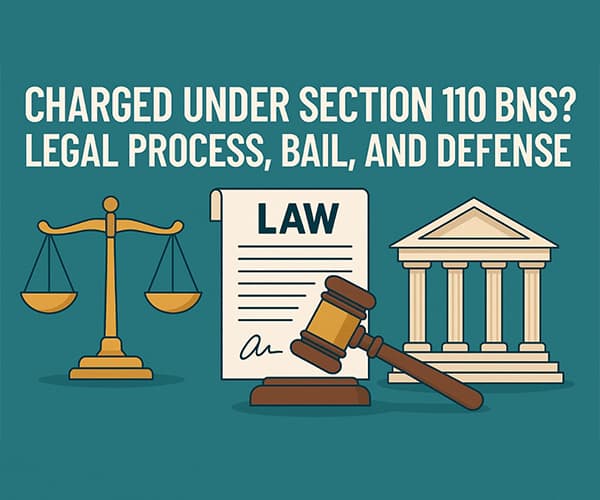Charged Under Section 110 BNS? Legal Process, Bail, and Defense

Being charged under Section 110 of Bharatiya Nyaya Sanhita (BNS) is a serious legal event that implicates stringent criminal liabilities, penalties, and the risk of lasting consequences on your personal and professional life. Section 110 BNS is a cornerstone in India's updated criminal code, criminalizing acts that cause hurt by endangering life or personal safety due to recklessness, negligence, or intentional risky conduct, not only those acts that result in grave or fatal injuries but also those that put others in significant danger.
Understanding the Legal Process Under Section 110 BNS
The process typically starts with the filing of a police complaint or FIR if someone alleges they have been endangered or injured by your conduct. The police are obligated to investigate promptly under Section 110 BNS, collecting evidence, eyewitness accounts, medical reports, and forensic details. If sufficient evidence exists, a chargesheet is submitted to the court, and summons or arrest warrants may be issued against the accused.
Once formally charged under Section 110 of Bharatiya Nyaya Sanhita, the accused must appear before a magistrate. Here, the question of bail becomes critical. Whether bail is granted is at the court's discretion, but strong legal arguments, emphasizing lack of intent, demonstrable precaution, or weak evidence, can tip the scales in your favor. Courts will assess the severity of the risk posed, the degree of actual harm, and your criminal record before making a bail decision.
The subsequent legal proceedings involve framing of charges, presentation of prosecution evidence, cross-examination, and then the defense's case. Section 110 BNS allows the defense to present evidence such as proof of adherence to safety protocols, absence of intent or negligence, alibis, and character references. Throughout, the burden remains on the prosecution to prove beyond reasonable doubt that your acts met the criteria for criminal liability under Section 110, including a causal link between your conduct and the alleged harm or risk.
If convicted, the punishment under Section 110 BNS can include imprisonment, substantial fines, or both, depending on how egregious the endangerment or injury is deemed. Both aggravating and mitigating factors, such as prior conduct, gravity of risk, and efforts to avert harm, can affect sentencing.
If you are facing prosecution under Section 110 of Bharatiya Nyaya Sanhita, do not leave your future to chance. Prompt legal intervention by experienced criminal lawyers is vital for securing bail, building a strong defense, and protecting your rights at every stage. Reach out to Vakeel Saab's expert team by calling +91 72848 72848 or visiting www.vakeelsaab.com for confidential and strategic legal assistance tailored to Section 110 BNS cases.
Frequently Asked Questions
Q1: What types of acts lead to charges under Section 110 BNS? Acts such as reckless driving, mishandling hazardous materials, or any negligent behavior causing hurt or risking life, even if unintended, can lead to prosecution under Section 110 BNS.
Q2: Is bail available in Section 110 BNS cases? Yes, but it is discretionary. Courts consider the seriousness of the alleged conduct, prior criminal history, and whether you pose further risk to the public.
Q3: How does one mount a strong defense under Section 110 BNS? Key strategies include providing evidence of due diligence and safety compliance, proving lack of intent or negligence, raising doubts about causation, and challenging the credibility of witnesses.
Q4: Can charges under Section 110 BNS be quashed before trial? If there is clear evidence of false implication, insufficient grounds, or procedural violations, your lawyer may move to quash the complaint or discharge you from the case.
Q5: What are possible penalties if convicted under Section 110 BNS? Conviction can result in imprisonment, fines, or both, with quantum determined by the degree of harm and risk caused.
Q6: Are offences under Section 110 BNS compoundable? Generally, Section 110 BNS offences are non-compoundable, meaning cases proceed through the full trial process regardless of out-of-court settlements.
Q7: Can victims claim compensation under Section 110? Yes, victims can file separate civil suits or request court-ordered compensation alongside the criminal case.
Q8: Is Section 110 BNS applicable to workplace accidents? Yes, if employers or employees act negligently, resulting in injury or risk to others, they can be prosecuted under Section 110.
Q9: Will an FIR under Section 110 BNS affect my employment or travel? Pending charges can impact background checks, job prospects, and passport issuance; prompt legal action is needed to safeguard your interests.
Q10: Where can I get the best defense for Section 110 BNS allegations? Contact Vakeel Saab at +91 72848 72848 or www.vakeelsaab.com for expert criminal defense dedicated to Section 110 BNS cases.
SEO Tags:Section 110 Bharatiya Nyaya Sanhita, Section 110 BNS, charged under Section 110, Section 110 BNS bail, Section 110 legal process, Section 110 BNS defense, endangering life BNS, Section 110 BNS lawyer, non-compoundable offences BNS, Section 110 punishment, Section 110 BNS criminal lawyer, criminal defence Section 110, Vakeel Saab legal services, hurt by negligence Section 110, best criminal lawyer India, new criminal law BNS, prosecution Section 110 BNS
Related Articles
The Importance of Consulting a Property Lawyer for Real Estate Issues
Blog
How to File a POCSO Complaint in India: Step-by-Step Legal Process
Blog
What punishments does the law give for giving, taking, or asking for dowry?
Blog
Reasons for the Increasing Divorce Rates in India
Blog
What is a Special Leave Petition? Meaning, Features, Process & & Who Can File?
Blog
What Is the Difference Between Mutual Divorce and Contested Divorce?
Blog